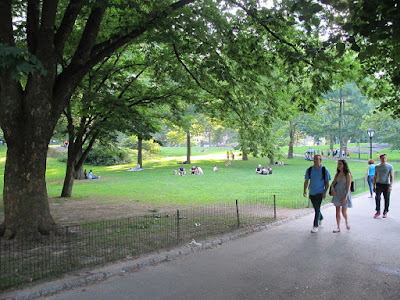In high school, I wasn’t a fan of Blur. But I was excited when Leisure, their
debut album, and Bandwagonesque,
an early Teenage Fanclub record, were promoted as signs that young U.K. pop
bands were ready for the consideration of stateside listeners. Leisure’s cover
portrayed a cute, smiling swimmer in a bathing cap and lipstick, an Amélie à la piscine, and Bandwagonesque’s
depicted a bright yellow money sack over a reddish pink background. I had heard
the shoegaze/baggy pair of singles, “She’s So High” and “There’s No Other Way,”
from Leisure,
and the tunes, the art, and the ads moved me to bring both CDs to my friend
Elliot’s birthday party. But our friend Doug, way hipper than us, said
something disparaging about the albums (or maybe the publicity), and that
dampened things for me.
In college, Doug was listening to Blur’s second record, Modern Life Is
Rubbish, and the clean, spiky sound of that and the band’s next two LPs
filled my dorm rooms for years. On Parklife, I liked
the pogo-friendly story of “Tracy Jacks,” a bureaucrat who loses it in the face
of his particular kind of no future, and I loved The Great Escape, Parklife’s more
robust follow-up. Songs like the supercharged “Bank Holiday” and the sensual
“Girls and Boys” made it seem like Blur were participating in the culture they
were critiquing, but calling their record The Great Escape showed
the band understood that culture perfectly.
Blur’s next, eponymous album was full of buzzy guitars and less
British-oriented themes, and the cover art wasn’t cute at all: it was an
appropriately blurry photo of a nurse wheeling a stretcher. One rock critic who
saw them live mentioned the vigor of “Song 2,” a distorted burst of sound that
might have been Blur’s answer to the Ramones. When I saw the band play the
Orpheum Theater in Boston, I noticed the crowd’s joy when they played their
early singles, “She’s So High” especially, which filled the room like a wave.
About 15 years after that show, I had the unbelievable luck of
living across the street from Academy Records in Brooklyn. Sometimes the staff
would prop open the doors, and the album on the store’s stereo would be audible
in the street. One day, I heard a boyish voice and some thick electric guitar,
and saw a copy of Leisure sitting
on the now-playing shelf behind the register. I wondered how much they were
asking for it.
I wanted the record for “She’s So High,” a song I had come to
appreciate more with time. It’s just a massive, radiant mount of gazey rock
with a message that everyone can understand: She’s so unattainable. I want her. And
that’s it, or so I thought until I remembered some lines by the English poet
William Blake that the American poet Robert Bly included in Iron John, his
book about masculinity in literature and ritual. Blake’s verse depicts a male
infant’s surrender to parental dominance, which ends with the baby clinging
unhappily to his mother.
Struggling in my father’s hands,
Striving against my swaddling bands,
Bound and weary I thought best
To sulk upon my mother’s breast.
And here are the lyrics to “She’s So High,” which Blur’s lead
singer Damon Albarn alternately intones, sings, and semi-wails:
I see her face
Everyday
I see her face
It doesn’t help me
She’s so high
I want to crawl all over her
I think of her
Everyday
I think of her
It doesn’t help me
She’s so high
I want to crawl all over her
She doesn’t help me
She’s so high
I want to crawl all over her
As a teenager, it was easy to imagine that the song was about a
beautiful schoolmate in the hall. But Blake’s image of the unhappy baby, and
what I’ve read about the unmet needs of children in Getting the Love You
Want, a self-help book by the psychologist Harville Hendrix, has
lately made me wonder. Because the first person we wanted to “crawl all over”
was mum, someone whose face we saw, and who we thought about in infancy, all
the time.
Albarn repeats “She
doesn’t help me” as “She’s So High” nears its final chorus, and he could easily
have had a cute, pop-loving peer in mind. But you never know. The song works as
a longing for and protest against a mother or a crush. Either way, it’s a powerful
expression of immaturity that’s stood the test of time.




